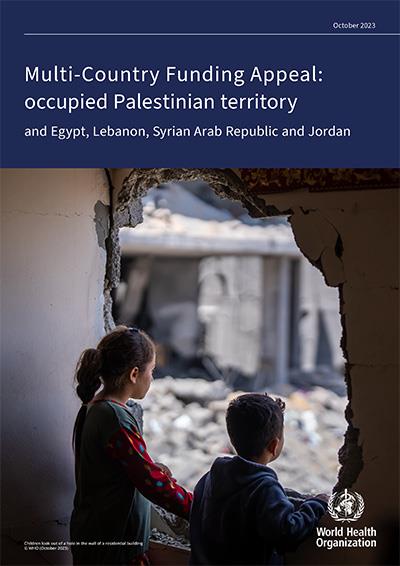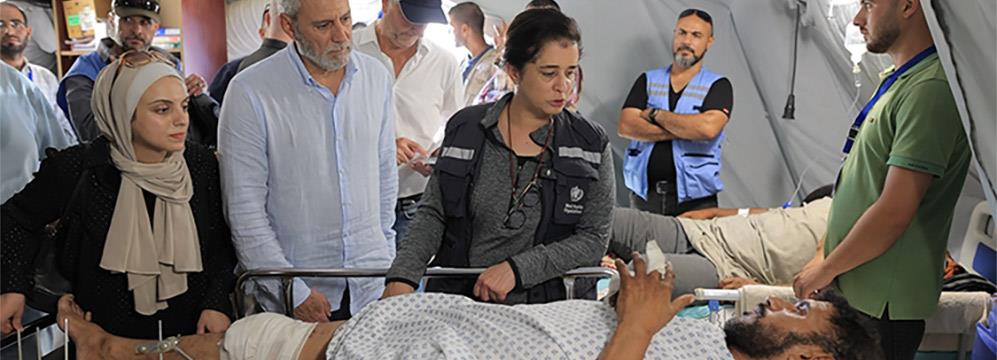
DELIVERED BY
Nada Al-Nashif, United Nations Deputy High Commissioner for Human Rights
AT
55th session of the Human Rights Council
Distinguished President of the Human Rights Council,
Excellencies,
Ladies and Gentlemen,
My presentation today covers two reports under the Council’s agenda item 7, concerning the human rights situation in Palestine and other occupied Arab territories.
I will begin with the High Commissioner’s report on Israeli settlements in the Occupied Palestinian Territory, including East Jerusalem, and in the occupied Syrian Golan, submitted pursuant to Human Rights Council resolution 52/35. This report analyses developments related to the period between 1 November 2022 and 31 October 2023.
The reporting period has seen a drastic acceleration, particularly after 7 October 2023, of long-standing trends of discrimination, oppression and violence against Palestinians, that accompany Israeli occupation and settlement expansion, bringing the West Bank to the brink of catastrophe.
The report observes that policies of the current Government of Israel appear aligned, to an unprecedented extent, with the goals of the Israeli settler movement to expand long-term control over the West Bank, including East Jerusalem, and to steadily integrate this occupied territory into the State of Israel.
During the reporting period, Israel took steps to transfer administrative powers relating to settlements and land administration from the military authorities to Israeli government offices, whose primary focus is to provide services within the State of Israel. The basic premise of the law of occupation is that occupation is a temporary measure, neither causing nor implying any transfer of sovereignty. The report therefore raises serious concerns that a series of measures, including this transfer of powers to the Israeli civilian officials, could facilitate the annexation of the West Bank in violation of international law, including the Charter of the United Nations.
Mr. President,
The ongoing expansion of Israeli settlements involves numerous human rights violations against Palestinians, including their right to self-determination, their right to equality and their right to non-discrimination.
There are now around 700,000 Israeli settlers in the West Bank, including East Jerusalem. These settlers live in 300 settlements and outposts, all illegal under international humanitarian law, as they amount to the transfer by Israel of its own civilian population into the territories it occupies. Such transfers amount to a war crime that may engage the individual criminal responsibility of those involved.
The size of existing Israeli settlements has also expanded markedly. During the reporting period, approximately 24,300 housing units, within existing Israeli settlements in the West Bank in Area C, were advanced or approved; the highest on record since monitoring began in 2017. This included approximately 9,670 new housing units in East Jerusalem.
Mr. President,
During the reporting period, there has been a dramatic increase in the intensity, the severity and the regularity of Israeli settler violence against Palestinians, accelerating their displacement from their land, in circumstances that may amount to forcible transfer.
In the first nine months of 2023, 835 incidents of settler violence were recorded by the United Nations – the highest on record. Then, between 7 and 31 October 2023, the United Nations recorded 203 settler attacks against Palestinians, and the Human Rights Office monitored the killing of 8 Palestinians, including one boy, all by the use of firearms by settlers. Out of these 203 settler attacks, more than one-third involved threats with firearms, including shooting. Furthermore, almost half of all incidents between 7 and 31 October involved Israeli forces escorting or actively supporting Israeli settlers while carrying out the attacks.
The line between settler violence and State violence has further blurred, including violence with the declared intent to forcibly transfer Palestinians from their land. In cases monitored by OHCHR, settlers arrived masked, armed and sometimes wearing the uniforms of Israeli security forces. They destroyed Palestinians’ tents, solar panels, water pipes and tanks, hurling insults and threatening that, if Palestinians did not leave within 24 hours, they would be killed. Furthermore, by the end of the reporting period, Israeli security forces had reportedly handed out some 8,000 weapons to “settlement defence squads” and “regional defence battalions” in the West Bank. After the 7th of October, the United Nations human rights office documented cases of settlers wearing full or partial Israeli army uniforms and carrying army rifles, harassing and attacking Palestinians, including shooting at them at point-blank range.
Palestinian herding communities in the West Bank remain particularly vulnerable to settler violence and forcible transfer. Between 7 October and 31 October 2023 alone, in 15 herding communities across the West Bank, at least 136 households totalling 878 people, including 435 children, were displaced through settler violence and access restrictions.
The report before you contains details of cases of violence monitored by our Office. This includes accounts from Palestinian women from the Wedadie herding community, describing gender-based violence aimed at degrading and intimidating them.
The absence of accountability for settler violence is a key factor in the ongoing coercive environment, raising continued concerns about the forcible transfer of Palestinians. The lack of accountability is furthermore a manifestation of a dual system of criminal justice that has had discriminatory effects on Palestinians.
Mr. President,
Israeli authorities continued to implement eviction and demolition orders against Palestinians based on discriminatory planning policies, laws and practices, including on the grounds that properties lacked building permits. During the reporting period, Palestinian-owned structures were demolished by Israel at one of the fastest rates on record: 917 Palestinian-owned structures in the West Bank, including 210 in East Jerusalem, were demolished. This resulted in the displacement of 1,015 Palestinians.
It is noteworthy that out of the 210 demolitions in East Jerusalem, 89 were self-demolitions by their owners to avoid paying fines from the Israeli authorities. This epitomizes the coercive environment that the Palestinians live in.
Mr. President,
The report before us also documents the ongoing Israeli plan to double the settler population in the Syrian Golan by 2027. Today, the Israeli settlers are distributed among 35 different settlements. Beside settlement expansion, commercial activity has been approved, which may continue to limit the access of the Syrian population to land and water.
Despite this Council’s ongoing efforts, Israeli settlement activity in the Occupied Palestinian Territory and the occupied Syrian Golan continues unabated.
The recommendations in the report include the recommendation to Israel to end its 56-year old military occupation of the Occupied Palestinian Territory, including East Jerusalem, and the occupied Syrian Golan, as part of a broader process towards achieving equality, justice, democracy, non-discrimination and the fulfilment of all human rights for all Palestinians.
The second report before you is the report of the Secretary-General on the occupied Syrian Golan submitted pursuant to Human Rights Council resolution 52/33. The Human Rights Council, through this resolution, called upon Israel to cease from changing the physical character, the demographic composition, the institutional structure and legal status of the occupied Syrian Golan and as the occupying Power, to comply with the relevant resolutions on the occupied Syrian Golan, in particular, Security Council resolution 497 (1981), in which the Council, inter alia, decided that the Israeli decision to impose its laws, jurisdiction, and administration on the occupied Syrian Golan was null and void and without international legal effect.
The report summarizes the responses received to a request for information about the implementation of the resolution. Those responses came from Cuba, Iraq, Iran, Guyana, Mexico and the Syrian Arabic Republic.
Mr. President, this concludes my introduction of reports submitted under agenda item 7.
Thank you.







